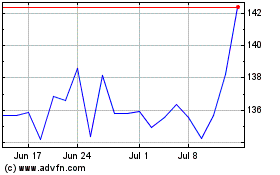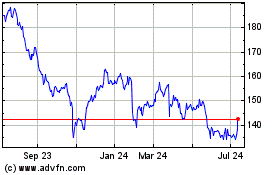Today's Top Supply Chain and Logistics News From WSJ
May 02 2017 - 7:29AM
Dow Jones News
By Paul Page
Sign up:With one click, get this newsletter delivered to your
inbox.
The peak-season shipping stakes are getting higher for carriers
and customers alike. United Parcel Service Inc. is asking major
retailers to help pay for the extra workers and added space needed
during the year's busiest shipping periods, the WSJ's Paul Ziobro
reports, and wants them to pay when their forecasts veer of course.
UPS, like rival FedEx Corp., is grappling with the e-commerce boom,
and the company wants to recoup the billions it is investing to
handle the surge in online shopping, a shift that's triggered an
upheaval in distribution networks, fractured traditional
forecasting and carved back profit margins. FedEx has dropped some
retailers that refused price increases, while UPS appears to be
taking a more targeted "surge pricing" approach. Amazon.com Inc.
tried a variation on the strategy last year when it started
charging a premium for merchants to use its warehouses in November
and December. UPS appears to be saying with the new effort that it
will take on the investment but not all of the risk.
America's packaged-food giants are being pushed out of the most
coveted space in the grocery supply chain. Instead of promoting
canned soup, cereal and cookies, grocery stores are giving better
play to fresh food, prepared hot meals, and items from local
upstarts favored by increasingly health-conscious consumers. The
WSJ's Annie Gasparro reports that's changing the very physical
structure of stores, with grocery chains increasingly carving out
space for counters with fresh meals that shoppers can take home.
That leaves less room for the industry heavyweights and the
packaged goods that saw sales volume fall 2.4% in the first
quarter, part of a long-running trend that has accelerated during a
long stretch of falling food prices. The push has been fueled by
excess supplies of staples like meat and dairy, and left companies
like Kraft Heinz Co. and Pinnacle Foods Inc. to win back prime
space in shopping carts and grocery shelves.
Nintendo Co. isn't playing around in getting its new game
console to market. The electronics giant shifted from ocean to air
to ship its new Switch machine in its first month on the market,
the WSJ's Takashi Mochizuki reports, a costly logistics measure
responding to unexpectedly high demand. One analyst says the change
could add $45 in expense per unit, highlighting the premium on
early sales in the fiercely competitive game-console market. Strong
early sales can help form a kind of eco-system of games built
around a particular console, fueling still more sales. Turbulent
trends in shipping may not have helped keep Nintendo on the ocean,
with lengthy backlogs reported at seaports in Asia and Europe as
container lines align capacity with new alliances. Air operators
seem to be benefiting: analysts WorldACD say global airfreight
volume jumped 16.4% in March, and business out of Europe and Asia
soared 19%.
ECONOMY & TRADE
Depressed commodity prices and sagging currency values are
adding up to a toxic mix for food distribution in Africa. Along
with bad weather and civil conflict in some countries, the
conditions are fueling record starvation levels across the
continent, even in politically stable countries, amid the worst
harvests in three decades. The WSJ's Nicholas Bariyo reports that
falling commodity prices across central and southern Africa have
sent currencies more than 30% lower against the dollar in the past
six months, spiking inflation and undermining purchasing power.
Commodity prices have moderately recovered since last year, but
they remain far below their 2013 peak, and the growing toll on
populations shows how big shifts in global trading markets can
reverberate for years across countries that depend on commodities.
Relief groups are struggling to respond since the impact is hitting
such a broad swath of the continent.
QUOTABLE
IN OTHER NEWS
U.S. factory activity decelerated in April, and measures of new
orders and employment signaled slowing momentum in the sector.
(WSJ)
Americans' spending was flat in March, marking the weakest
two-month stretch of spending in more than two years. (WSJ)
Crude futures are falling on concerns about growing U.S. oil
production in an oversupplied market. (WSJ)
Atlanta officials expect a rebuilt section of Interstate 85 to
reopen by Memorial Day, three weeks ahead of schedule. (WSJ)
Rue21 Inc. and its lenders are in negotiations surrounding the
teen apparel retailer's likely bankruptcy filing. (WSJ)
Pembina Pipeline Corp. will buy Veresen Inc. for about $4.3
billion in a deal creating one of Canada's biggest energy
infrastructure companies. (WSJ)
A coalition of big investor groups urged food companies to
restrict the use of antibiotics in their meat supply chains.
(Financial Times)
Six people were killed and 19 injured when a crane collapsed at
a Samsung Heavy Industries shipyard in South Korea. (Yonhap)
Flatbed trucking company Daseke Inc. acquired Indiana-based The
Schilli Cos. and Big Freight Systems of Winnipeg, Ontario. (Heavy
Duty Trucking)
The union representing UPS aircraft mechanics said it will try
for a second time to gain clearance to strike in a long-running
contract negotiation. (Reuters)
China's online sales grew 32% in the first quarter. (Xinhua)
Cotton prices world-wide have increased about 9% since the start
of the year. (Sourcing Journal)
Japan's big three shipping lines lost a combined $691 million on
container operations in the fiscal year ending March 31. (American
Shipper)
Sagawa Express will follow Yamato Transport in raising rates in
Japan's labor-starved parcel delivery market. (Nikkei Asian
Review)
First-quarter revenue at Hong Kong's Orient Overseas Container
Line grew 6.4% from a year ago as freight rates were almost flat.
(The Loadstar)
Third-party logistics is one of the fastest-growing sectors in
the busy transport hub of Chicago. (Chicago Magazine)
Canadian Pacific Railway Ltd. will start using North America's
first 60-foot intermodal container to carry goods for Canadian Tire
Corp. (Progressive Railroading)
Pennsylvania's powerful alcohol control agency is seeking a
federal waiver to import rum from Cuba. (ABC News)
ABOUT US
Paul Page is deputy editor of WSJ Logistics Report. Follow him
at @PaulPage, and follow the entire WSJ Logistics Report team:
@brianjbaskin, @jensmithWSJ and @EEPhillips_WSJ and follow the WSJ
Logistics Report on Twitter at @WSJLogistics.
Write to Paul Page at paul.page@wsj.com
(END) Dow Jones Newswires
May 02, 2017 07:14 ET (11:14 GMT)
Copyright (c) 2017 Dow Jones & Company, Inc.
United Parcel Service (NYSE:UPS)
Historical Stock Chart
From Mar 2024 to Apr 2024

United Parcel Service (NYSE:UPS)
Historical Stock Chart
From Apr 2023 to Apr 2024
